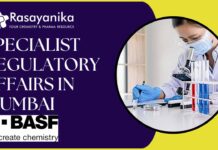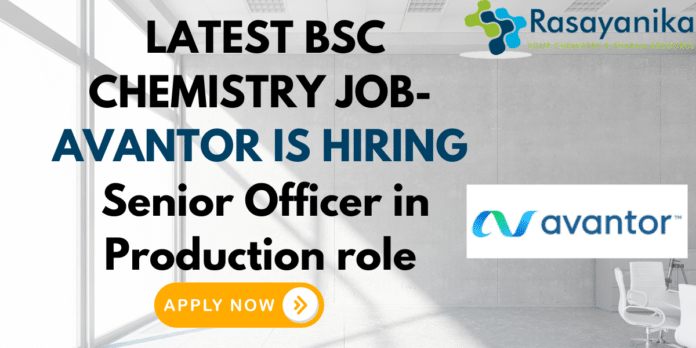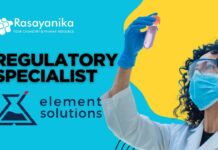LATEST BSC CHEMISTRY JOB- AVANTOR IS HIRING – Senior Officer – Production role – APPLY NOW
Avantor is seeking a highly motivated and skilled individual to join their team as a Senior Officer – Production at company’s Panoli manufacturing facility in India. As a Senior Officer, you will play a crucial role in ensuring the smooth and efficient operation of our production processes to meet our key business goals and objectives.
Company : Avantor
Role – Senior Officer – Production
Locations – Panoli, IND
Time type – Full time
Job requisition id – R-150867
Job Summary of Senior Officer – Production role:
Senior Officer- Production is responsible for the production operations at the Panoli manufacturing facility in order to meet key business goals and objectives.
What we’re looking for
Education: B.Tech/BE (Chemicals/Chemistry)
How you will thrive and create an impact as a Senior Officer – Production role:
- Under moderate supervision, Prepare, setup, weigh, package, fill and label.
- Work in accordance with cGMP, Quality, Environmental, Health & Safety and departmental procedures in order to meet customer demands.
- Operate production scales, including verifications and calibrations.
- Package finished product for shipping (boxing, labeling) per Work Instructions. Handle hazardous materials using all appropriate or mandatory safety gear.
Check out RASAYANIKA for more updates !
Here are some interview questions and sample answers for the role of Senior Officer – Production:
- Can you tell us about your educational background and any relevant experience in production operations?
Sample answer: I hold a B.Tech degree in Chemical Engineering, which has provided me with a solid foundation in the principles and practices of production operations. During my academic tenure, I also gained practical experience through internships and industrial training, where I worked on projects related to process optimization and quality control in manufacturing plants. This hands-on experience has prepared me to effectively contribute to production operations in a professional setting.
- What do you understand by cGMP (current Good Manufacturing Practices) and how would you ensure compliance with these standards in your role?
Sample answer: cGMP refers to a set of guidelines and regulations that ensure the quality, safety, and consistency of products manufactured in the pharmaceutical, chemical, and other related industries. To ensure compliance with cGMP, I would closely follow standard operating procedures, adhere to cleanliness and hygiene protocols, maintain accurate documentation of production activities, and actively participate in training programs to stay updated on any changes or new requirements. I understand the importance of cGMP in maintaining product integrity and customer satisfaction, and I am committed to upholding these standards in my role.
- How do you prioritize tasks and manage your time in a production environment where multiple demands and deadlines exist?
Sample answer: In a production environment, effective task prioritization and time management are crucial. I believe in setting clear goals and objectives for each day, week, or month, and breaking them down into smaller, manageable tasks. I would prioritize tasks based on their urgency, impact on production timelines, and customer requirements. Additionally, I would leverage tools such as to-do lists, calendars, and project management software to stay organized and ensure that deadlines are met. I am also open to adapting my approach as needed to accommodate any unforeseen circumstances or changes in priorities.
- How do you handle working with hazardous materials and ensure safety in the production process?
Sample answer: Working with hazardous materials requires strict adherence to safety protocols. I prioritize safety by ensuring I am well-versed in handling procedures and safety guidelines specific to the hazardous materials involved. This includes understanding material safety data sheets (MSDS), using appropriate personal protective equipment (PPE), and following established procedures for storage, handling, and disposal. I am committed to promoting a safety-conscious culture by actively participating in safety training programs, conducting regular safety inspections, and promptly reporting any safety concerns or incidents to the relevant authorities.
- Can you provide an example of a situation where you had to troubleshoot an issue or problem in a production process? How did you approach it?
Sample answer: In a previous role, we encountered an issue where the production scales were providing inconsistent measurements, leading to inaccurate product formulations. To troubleshoot the problem, I first reviewed the scale’s operating manual and performed basic maintenance checks such as cleaning and calibration. However, the issue persisted. I then collaborated with the maintenance team to conduct a more thorough inspection and identified a faulty sensor that was causing the inconsistency. We promptly replaced the sensor, re-calibrated the scales, and conducted several test runs to ensure accuracy. Throughout the process, I maintained open communication with my team and documented the steps taken for future reference.
Remember to adapt these answers based on your own experiences and knowledge. These sample responses should serve as a starting point to help you prepare for the interview.
Good luck!



















































